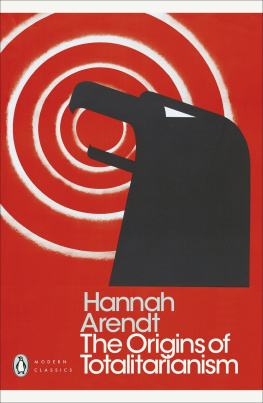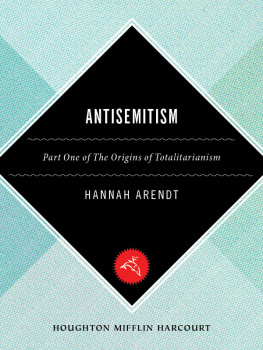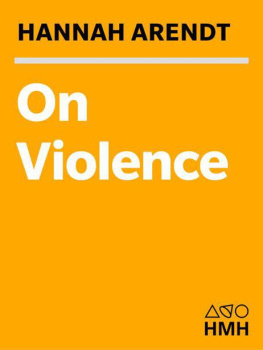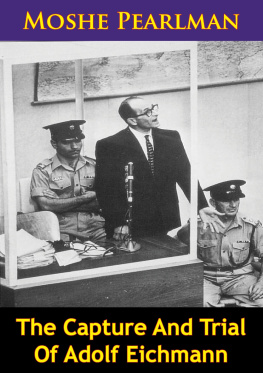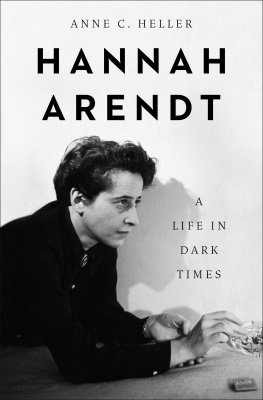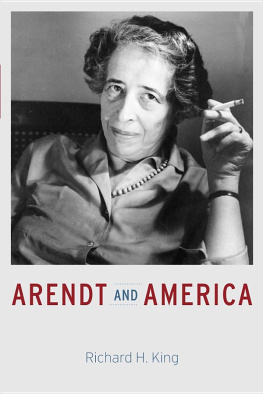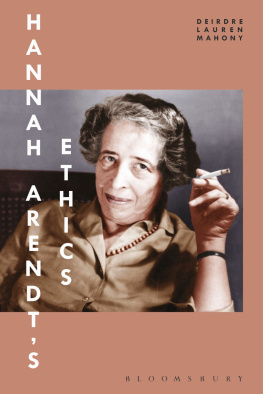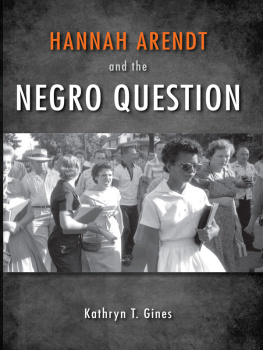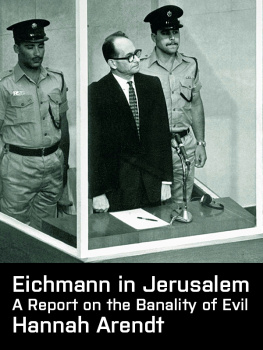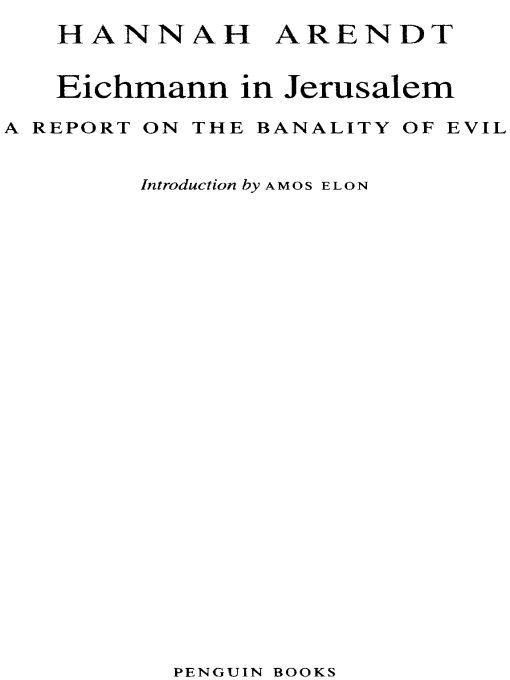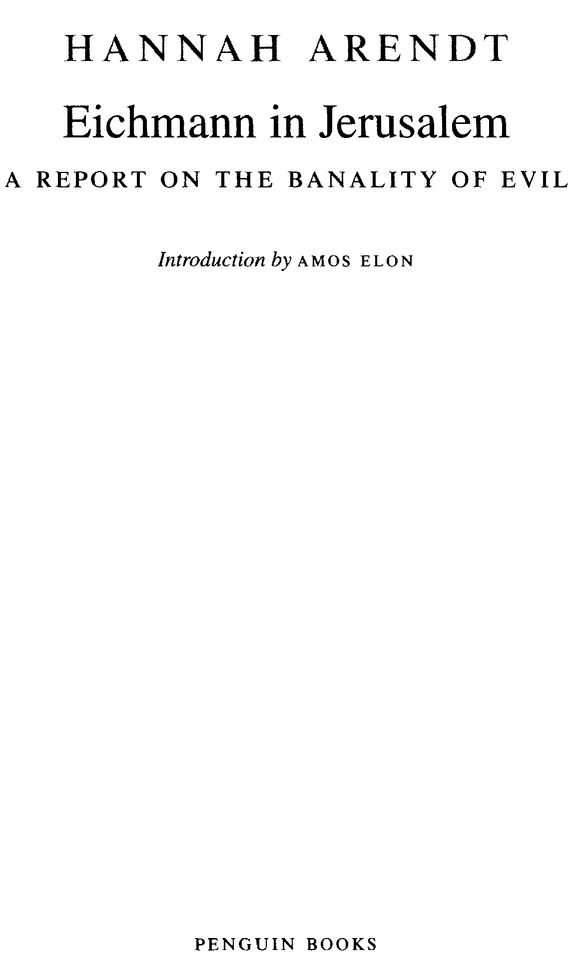Table of Contents
EICHMANN IN JERUSALEM
HANNAH ARENDT was born in Hanover, Germany, in 1906. She studied at the Universities of Marburg and Freiburg and received her doctorate in philosphy at the University of Heidelberg, where she studied under Karl Jaspers. In 1933 she fled from Germany and went to France, where she worked for the immigration of Jewish refugee children into Palestine. In 1941 she went to the United States and became an American citizen ten years later.
She was a research director of the Conference on Jewish Relations, chief editor of Schocken Books, executive director of Jewish Cultural Reconstruction in New York City, a visiting professor at several universities, including California, Princeton, Columbia, and Chicago and university professor at the graduate Faculty of the New School for Social Research. She was awarded a Guggenheim Fellowship in 1952 and won the annual Arts and Letters Grant of the National Institute of Arts and Letters in 1954.
Hannah Arendts books include The Origins of Totalitariansim, Crisis in the Republic, Men in Dark Times, Between Past and Future: Eight Exercizes in Political Thought, and Eichmann in Jerusalem: A Report on the Banality of Evil. She also edited two volumes of Karl Jasperss The Great Philosophers. Hannah Arendt died in December 1975.
AMOS ELON was born in Vienna, Austria, and has spent most of his adult life in Jerusalem. A frequent essayist, lecturer, and critic who is well known for his articles in The New Yorker and The New York Review of Books, he is the author of such bestselling works as The Israelis, Flight into Egypt, Founder, Herzel, and most recently The Pity of It All: A Portrait of the German-Jewish Epoch.
To access Great Books Foundation Discussion Guides
online, visit our Web site at www.penguin.com
or the foundation Web site at www.greatbooks.org.
Introduction
THE EXCOMMUNICATION OF HANNAH ARENDT
In December 1966, Isaiah Berlin, the prominent philosopher and historian of ideas, was the guest of his friend, Edmund Wilson, the well-known American man of letters. An entry in Wilsons diary mentions an argument between the two men. Berlin gets violent, sometimes irrational prejudice against people, Wilson noted, for example [against] Hannah Arendt, although he has never read her book about Eichmann. In a memoir in the Yale Review in 1987, Berlin made exactly the same charge against Wilson and elaborated upon this in a 1991 interview with the editor of Wilsons diary. We dont know the outcome of this quarrel. One thing we do know: more than three years after the publication of Hannah Arendts Eichmann in Jerusalem: A Report on the Banality of Evil first appeared in print, the civil war it had launched among intellectuals in the United States and in Europe was still seething. Describing the debate that raged through his own and other families in New York, Anthony Grafton later wrote that no subject had fascinated and aroused such concern and serious discussion as the series of articles Hannah Arendt had published in The New Yorker about the Eichmann trial, and the book that grew out of them. Three years after the publication of the book, people were still bitterly divided over it. No book within living memory had elicited similar passions. A kind of excommunication seemed to have been imposed on the author by the Jewish establishment in America. The controversy has never really been settled. Such controversies often die down, simmer, and then erupt again. It is perhaps no accident that at this time of a highly controversial war in Iraq, Arendts books are still widely read and that, even though close to 300,000 copies of her book on Eichmann alone have so far been sold, this new edition is now published by Penguin.
Eichmann in Jerusalem continues to attract new readers and interpreters in Europe, too. In Israel, where the Holocaust was long seen as simply the culmination of a long unbroken line of anti-Semitism, from pharaoh and Nebuchadnezzar to Hitler and Arafat-David Ben-Gurion, the architect of the 1960 show trial wanted it that waythe growing interest among young people in this book suggests a search for a different view. A new Hebrew translation was recently published to considerable acclaim. In the past, the difficulty of many Israelis to accept Arendts book ran parallel to another difficulty-foreseen by Arendt early on-the difficulty of confronting, morally and politically, the plight of the dispossessed Palestinians. The Palestinians bore no responsibility for the collapse of civilization in Europe but ended up being punished for it.
In Europe, the collapse of communist totalitarianism contributed to the renewed interest in Arendts work. Interest was further kindled by the publication, in the past several years, of Arendts voluminous correspondence with Karl Jaspers, Mary McCarthy, Hermann Broch, Kurt Blumenfeld, Martin Heidegger, and her husband Heinrich Blcher. All bear witness to a rare capacity for friendship, intellectual and affectionate. Arendts correspondence with Blcher is the record also of the intense, lifelong conversation of a marriage that for two hunted fugitives was a safe haven in dark times. It still seems to me unbelievable, that I could achieve both a great love, and a sense of identity with my own person, she wrote Blcher in 1937 in what is one of the most remarkable love letters of the twentieth century. And yet I achieved the one only since I also have the other. I also now finally know what happiness is.
The letters shed a fascinating light on her thinking, and on some of the intimate feelings that went into the making of Eichmann in Jerusalem. You were the only reader to understand what otherwise I have never admitted, she wrote Mary McCarthy, namely, that I wrote this book in a curious state of euphoria. Like Arendts biography Rachel Varnhagen: The Life of a Jewish Woman, written before her emigration to the United States, Eichmann in Jerusalem was an intensely personal work. The writing helped give her relief from a heavy burden. As she wrote Mary McCarthy, it was a cura posterior, the delayed cure of a pain that weighed upon her as a Jew, a former Zionist, and a former German.
The main thesis of Eichmann in Jerusalem was summed up (not very felicitously) in its subtitle. It is odd, and sometimes mind-boggling to follow the overheated debates of four decades ago. Irving Howe claimed in his memoirs that the polemic in America was partly due to feelings of guilt, pervasive, and unmanageable yet seldom (until then) emerging into daylight. For this reason, Howe thought, something good came out of the confrontation with Arendt.
Some of the accusations voiced against the style and tone of the first version of her book, as published in The New Yorker, were well founded and were excised in the book, e.g. her description of Leo Baeck as the Jewish Fhrer; others were patently false. For example, it was claimed that Arendt had exonerated Eichmann but condemned the Jews. She had done nothing of the sort. Nor had she assaulted the entire court proceeding, as was frequently claimed; she only attacked the melodramatic rhetoric of the state prosecutor. She supported the death sentence as meted out by the court but would have preferred a differently formulated verdict. Contrary to frequent accusations, she never questioned the legitimacy of a trial in Israel by Israeli judges. Nor did she, as was frequently maintained, make the victims responsible for their slaughter by their failure to resist. In fact, she bitterly attacked the state prosecutor who had dared make such a heartless claim. Still, this accusation even found its way into the Encyclopedia Judaica. In a similar vein she was falsely accused of having claimed that Eichmann was an enthusiastic convert to Zionism and even to Judaism. Hand-me-downs from one critic to another drew on alleged references in the book which no one seemed to have checked. The argument was by no means restricted to academic circles but exercised young and old, historians, philosophers, journalists, as in the case of Graftons father; priests of several faiths; atheists; community functionaries; and professional propagandists. The attacks were often intensely personal. Many published reviews were serious, meticulously documented, fair and well-reasoned; others were clannish, full of personal invective, and of a surprisingly hackneyed intellectual level of mean personal innuendo. The book undoubtedly seems less controversial now than forty years ago as new generations of scholars take a fresh, less partisan look also on Arendts other writings on Jewish history, Israel, and Zionism.


